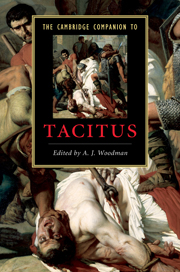Book contents
- Frontmatter
- Introduction
- Part I Contexts
- Part II Texts
- 3 The Agricola
- 4 The Germania as literary text
- 5 The faces of eloquence: the Dialogus de oratoribus
- 6 Fission and fusion: shifting Roman identities in the Histories
- 7 The Tiberian hexad
- 8 Hamlet without the prince? The Claudian Annals
- 9 ‘Is dying so very terrible?’ The Neronian Annals
- Part III Topics
- Part IV Transmission
- Chronological table
- Abbreviations and bibliography
- Index
8 - Hamlet without the prince? The Claudian Annals
from Part II - Texts
Published online by Cambridge University Press: 28 March 2010
- Frontmatter
- Introduction
- Part I Contexts
- Part II Texts
- 3 The Agricola
- 4 The Germania as literary text
- 5 The faces of eloquence: the Dialogus de oratoribus
- 6 Fission and fusion: shifting Roman identities in the Histories
- 7 The Tiberian hexad
- 8 Hamlet without the prince? The Claudian Annals
- 9 ‘Is dying so very terrible?’ The Neronian Annals
- Part III Topics
- Part IV Transmission
- Chronological table
- Abbreviations and bibliography
- Index
Summary
With the benefit of hindsight Tacitus can single out a moment for emphasis that may seem trivial when viewed from a contemporary perspective. Claudius is the subject of one such moment in 20. Thanks are proposed in the senate to individual members of the imperial family for avenging the death of Germanicus. L. Asprenas draws attention to the omission of Claudius' name, and it is added at the end. Pondering the moment, insignificant in itself, Tacitus is struck by 'the mockeries made of mortal affairs in every business: in fame, in hope, and in veneration everyone was destined for imperial power rather than the future princeps whom fortune was keeping in hiding' (3.18.4). Tacitus clearly relished the irony of the situation, and it gave him the opportunity to glance forward in his work. In 20 Claudius had been forgotten, as he would later be in 41 before the discovery that resulted in his elevation to Empire; and his liminal presence under Tiberius prefigures his marginality in his own reign. Claudius' passivity will become the central feature of Tacitus' portrait of an emperor dominated by his wives and freedmen.
- Type
- Chapter
- Information
- The Cambridge Companion to Tacitus , pp. 116 - 126Publisher: Cambridge University PressPrint publication year: 2010
- 1
- Cited by

